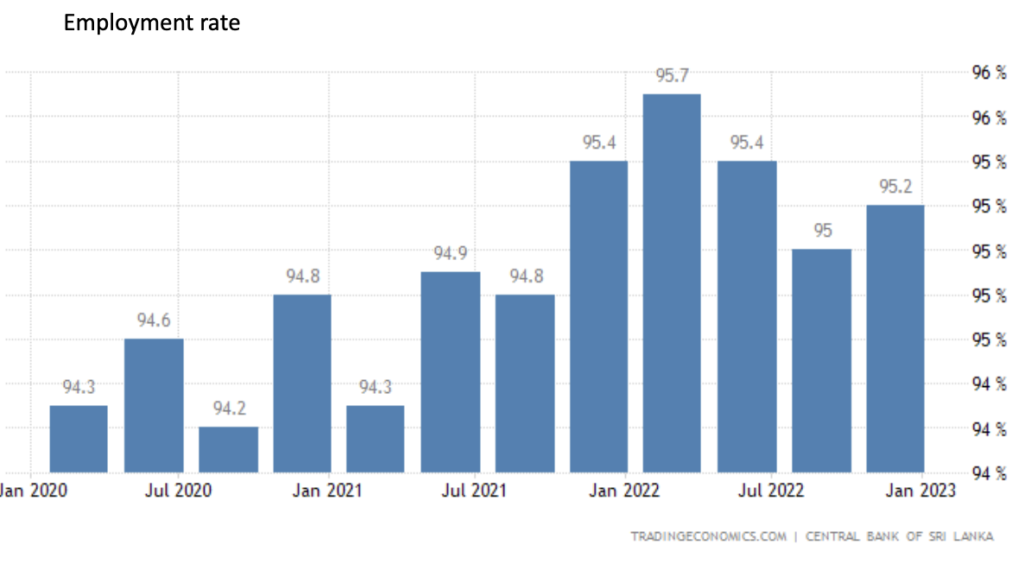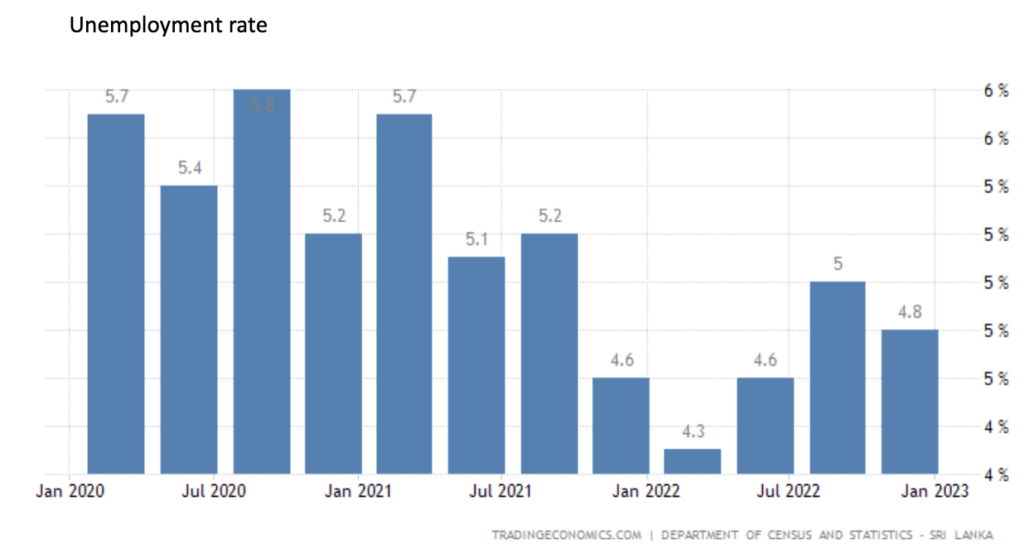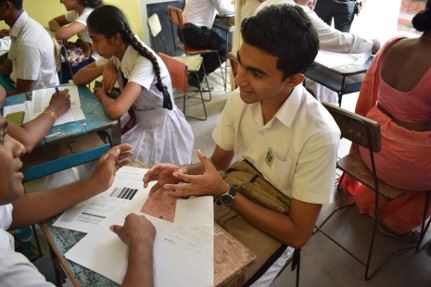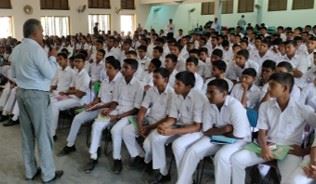Sri Lanka
RECENT ECONOMIC DEVELOPMENTS
The economy contracted by 2.3 percent in 2023, despite growth in third and fourth quarters (1.6 and 4.5 percent, respectively) following six quarters of contraction. This was driven by shrinking construction and mining, financial and IT services, and textile manufacturing, amid weak demand, tight private credit, and shortages of inputs, and was partly offset by growth in transport, accommodation, food, and beverage services, resulting from a rebound in tourism. Inflation remained benign, after declining to single-digit levels in July 2023, supported by currency appreciation and improved supply. However, with the recent spike in food prices and pass-through of fuel and utility prices, headline inflation as measured by the Colombo Consumer Price Index increased to 5.9 percent in February 2024. Labor force participation declined (from 49.8 to 48.8 percent between 2022 and third quarter of 2023), especially in urban areas. Households have adopted risky coping strategies to deal with lower incomes and price pressures, including using savings, taking on more debt, and limiting their diets. Food insecurity rose during the second-half of 2023, with 24 percent of households being food insecure.
After almost two years of monetary tightening, the central bank cut policy rates by 650 basis points between June and November 2023. Combined with improvements in liquidity, this resulted in a sharp decline in the government’s cost of domestic borrowing. While growth rates remain negative, private sector credit has been recovering monthly since June 2023.
In 2023, the current account recorded a surplus for the first time since 1977, as remittances and tourism rebounded sharply, and imports remained subdued. The continued external debt service suspension, inflows from development partners, large purchases of foreign exchange, and postponed repayments on existing credit lines have helped build usable official reserves to about 2 months of imports (US$3.1 billion by end-February 2024, compared to US$500 million in December 2022). The Rupee appreciated by 10.8 percent against the US Dollar in 2023.
Despite the primary balance registering a surplus—due to a significant increase in revenue and the repayment of an on-lent amount by an State-Owned Enterprise (SOE), a sharp rise in interest payments is estimated to have contributed to a high overall fiscal deficit in 2023. Interest payments absorbed approximately three-fourths of revenue collected.
Migration of professionals from Sri Lanka
Recent data from Sri Lankan government authorities shows that a large number of people have left the country in the last year, which is believed to be driven by the country’s economic crisis and ongoing uncertainty. Around 75000 Sri Lankans have left the country for overseas jobs in the first three months of 2024. Specially professionals like, doctors, nurses, engineers, lecturer are leaving and it creates a shortage of professionals in the industry. For an example, since most of lectures in the Faculty of Medicine and Allied Sciences of Rajarata University of Sri Lanka facing huge problems.
TVEC introducing NVQ 4 for the Career Guidance Practitioners
For the first time in the history TVEC has introduced first batch of career guidance practitioners (NVQ 4 level) to the country.
October 2023 Sri Lanka Report
Present situation in the country.
The economic situation of the country still is not steady and common people it is really hard to get by living. Job opportunities are less and some of the companies shut down their operations in Sri Lanka and this caused to loss many jobs.
Day to day living expenses is going high and job opportunities for the youth is getting lesser. As a results of this graduates try to follow vocational courses and going abroad.
Since governments has freeze recruitments, state institutions faced many difficulties to run in day to day operational activities. State Universities are facing a big issues in academic process since most of academics have left the country.
Career Guidance in the country.
First time in the history in Sri Lanka, held an examination for giving NVQ qualification for the professionals in career guidance. Those who are working in career guidance and having experience in delivering career guidance can apply. There is a written examination and practicals in the evaluation. This NVQ certificate awarding process regulated by Tertiary and Vocational Commission is Sri Lanka.
There is no any unique career guidance programs implementing in the country and even not any special attention as well. Since budget problems in state establishments, most of budget of career guidance programs have been limited or reduced.


April 2023 Sri Lanka Report
Current situation


- Stock market is growing
- Establishing financial situation
- Professionals are leaving the country
Career guidance
- Skill passport by TVEC:- gate way to the skills recognition
- Youlead school teacher training: 600
- Youlead Occupational Career Guidance: 300
- After 2 years, EDEX, Future Mind career fairs were held
May 2021 Sri Lanka Report
The Central Bank Annual Report 2020 was recently released, which communicated the following statistics:
- Labour force: 8.467 million
- Labour force participation rate: 50.6%
- Major economic activities contributing to GDP: Agriculture, Industry & Services

Secondary Education Sector Improvement Program:
“The Asian Development Bank (ADB) has approved a $400 million loan to support the Government of Sri Lanka in transforming its secondary education system to align with the demand for highly skilled and agile workers who can compete in the rapidly changing global economy. The program will support reforms under the government’s General Education Sector Development Plan, 2020–2025, particularly on upper secondary education. The program will benefit about 953,000 students annually, with skills that will benefit successive generations of students.”
July 2020 Sri Lanka Report
National response to COVID-19
- Closing of borders, import restrictions, enforcing island wide curfew and ordering to adopt working from home practices for both private and public sector.
- Sri Lanka has been ranked 9th best country in the world for its successful immediate response on tackling the virus.
- Curfew for over two months ‘halted’ almost all economic activities of Sri Lanka, impacting the labour market and all its participants in multiple ways.
- Government closed schools from 12 March till end of school holidays. Amid growing concerns the reopening was pushed till 7 July 2020.
Government emergency support for business owners
- Six month debt moratorium
- Request for landlords to reduce rent payments
- Working capital loans at low interest rates
- Discounted utility bills
E- Survey on Impact of COVID -19 – By Department of Labour
- Total of 2764 establishments responded to an e-Survey
- 1084 establishments indicated they would be unable to pay salaries to their employees.
- Some establishments chose to retain employees, with deducted salaries. SL Labour laws on employee termination are quite strict meaning unless an employee voluntarily resigns it is difficult to fire them.
- Tourism sector has been hit hard. Tourism which was struggling to survive after Easter Sunday attack in 2019 has slumped further.
Migrant Workers
- Remittances of migrant workers which contribute from 8 to 9% of GDP is drastically declining.


- Significant number of migrant workers are expected to return due to non-availability of demand for their work in destination countries.
- Influx of returning migrant employees means excess labour supply will be available in the country, which in a way will disadvantage the unskilled and less experienced job seekers.
- Career guidance counsellors response to COVID-19
Career guidance personnel in public sector forced to utilize digital and online tools. Most government agencies which had previously been reluctant to use digital tools had no choice but to adapt in order to work from home.
- Phone counselling was the most common form of delivery. It was the cheapest and most abundantly available option for both career guidance providers and seekers. Before COVID face to face interaction was the norm.
- Social media was used widely to spread awareness on career services and events. Instead of the traditionally held regional career fairs more free, online webinars were conducted.
- Learning during the pandemic has mostly occurred via online channels. Other distance learning channels such as television programs also had a tremendous reach in Sri Lanka during curfew period. Particularly since schools were closed and students island wide who did not have the luxury of e-learning tuned into TV programs to learn and educate themselves.
- Face-to-face interaction was the norm before COVID-19
- Career guidance events at schools before COVID-19
| Face-to-face interaction was the norm before COVID-19 |

September 2019 Sri Lanka report
Prepared by Anajana Kulasekara
- The International Labour Organization (ILO) recently published a report “Future of Work in Sri Lanka” that recognises the lack of career counselling for graduates contributes to the high youth unemployment observed in Sri Lanka.
- The report further states “Sri Lanka’s labour constraints are also a symptom of severe skill gaps. Despite high literacy (92%) and enrollment (97%) rates, the country’s educational and vocational systems face multiple challenges.”
- CareerMe launched its mobile app for career guidance on July 2019 together with National Human Resource Development Council of Sri Lanka.
- Sri Lanka’s president’s office has also initiated The ‘Smart Sri Lanka’ project which operates under the Sri Lanka Institute of Career Guidance with the aim of alleviating unemployment issues faced by the youth in the country.
- National Education Commission which is the policy making body in all aspects of education in Sri Lanka is working on the reappraisal of the existing Career Guidance policy of Sri Lanka.
Career Guidance in Sri Lanka - CareerMe®
by Anjana Kulasekara
 Workforce development in Sri Lanka faces the changing realities of globalization and competitiveness. Demand for job-specific skills is growing in Sri Lanka as its economy has grown and the composition of its GDP has shifted from agriculture to higher value-added industry services. Although Sri Lankan government continues to invest much resources for providing free education there is a huge skills mismatch between the educated youth and needs of the labor market. Skills mismatch and wrong selection of education courses has resulted in loss of government investment in education.
Workforce development in Sri Lanka faces the changing realities of globalization and competitiveness. Demand for job-specific skills is growing in Sri Lanka as its economy has grown and the composition of its GDP has shifted from agriculture to higher value-added industry services. Although Sri Lankan government continues to invest much resources for providing free education there is a huge skills mismatch between the educated youth and needs of the labor market. Skills mismatch and wrong selection of education courses has resulted in loss of government investment in education.
Career Guidance (CG) is recognized as an important tool to address the issues of skills mismatch and the more appropriate selection of education courses by helping young people identify and prepare for their careers along with the skills needed for the new economy. Career identification and preparation are critical for Sri Lanka’s youth to realize a successful future. Studies by various ministries and international organizations confirm that delivery of career guidance and soft skills are weak in Sri Lanka’s public-school system. As the public-school system practically has no structured career guidance delivery program and relies on outdated labor market information, a vast majority of students progressing through the educational system are ultimately unable to receive any guidance and depart frustrated at being unable to achieve their educational goals and underprepared for entry into the labor market.
was founded on the belief in the power and potential of career guidance to develop and realize aspirations of young people for sustainable national growth. The organization was initiated with the intention of addressing issues in delivery of career guidance and operates in technical collaboration with Grow Careers Australia. CareerMe® recognizes technology plays a pivotal role in ensuring all youth island-wide have the opportunity to obtain, at minimum, key aspects of guidance prior to leaving school. To this extent CareerMe® has set up a free, web-based platform to provide nationwide, impartial career guidance services in all three national languages (Sinhala, Tamil and English) for youth to explore education and career options that ‘FIT’. As part of CareerMe®’s career guidance process, youth are referred to the right education and training providers, financial service providers, as well as employers. Complemented with technology, CareerMe® also conducts trainings for school career guidance teachers/advisors so they receive the know-how to navigate through the complex web of information in the fast-changing world of work and can deliver effective, modern day career guidance to students.
As a pioneer, technology driven career guidance company in Sri Lanka, CareerMe® has been recognized by USAID-implemented project YouLead as their official career guidance partner and selected as the winner of the national digital social impact award, e-Swabhimani, under the Learning and Education category. CareerMe® is devoted to working with students, parents, teachers, career advisors, schools, training institutions, employers, donor community, the UN and international non-governmental organizations to ensure all Sri Lankan youth obtain vital career guidance before entering the world of work. We welcome opportunities to collaborate for the benefit and empowerment of Sri Lankan youth.

